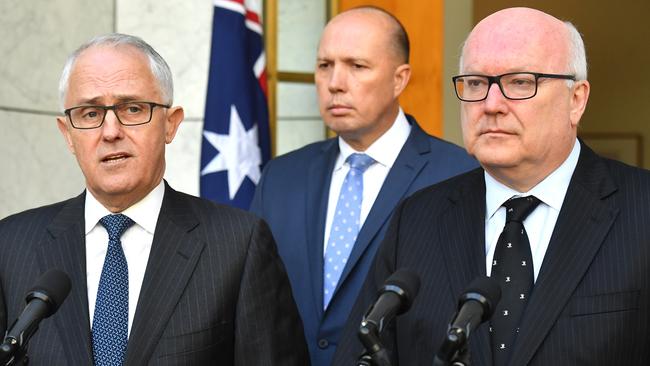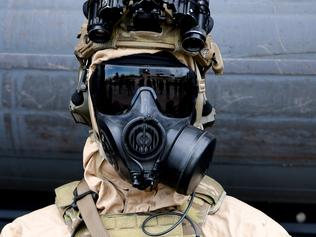Rise of ISIS puts Afghanistan on edge of abyss
There’s a serious danger of a collapse in Afghanistan with a third of the country captured by insurgents, an expert has warned.
There’s a serious danger of a collapse in Afghanistan with a third of the country captured by insurgents or under pressure and Islamic State threatening to swamp the Taliban, counter-terrorism specialist David Kilcullen has warned.
In The Weekend Australian, Kilcullen says the rise of ISIS is even more of a threat to the Taliban than to the government in Kabul or the US-led coalition. It fundamentally undercuts the Taliban strategy of waiting for NATO to withdraw and then seizing enough territory to force the government to negotiate.
“Each time I talk to friends in Afghanistan, I see decreasing confidence on the part of government officials, urban elites, and ordinary people in the towns and villages. And the sense of concern in 2016 is worse than I’ve ever seen it,” Mr Kilcullen writes.
And his concerns are echoed by Peter Leahy, who commanded Australia’s army during six years of fighting in Aghanistan.
Talks between the Afghan government and the Taliban are due to restart later this month and Kilcullen warns the Taliban that it is running out of time.
“This year is your last chance to make peace, to lock in your gains and negotiate a deal with Kabul and the international community. Because if you don’t, 2016 in Afghanistan may end up looking a lot like 2014 in Iraq — and if that happens, the Islamic State will eat you alive.”
He describes a meeting he had with Taliban emissaries in 2009 to which the insurgents brought a bottle of whiskey. He has no idea if the two men survived.
“But if I could find them, here’s what I would tell them: ‘Time is running out for the Taliban. For years, you joked that we had all the watches and you had all the time. You waited us out, kept your powder dry, and planned your comeback. But times have changed — a new generation of radical leaders, men who would never in a million years crack open a whiskey bottle with a foreign infidel, men who see you as weak and soft, have come from the shadows’.”
Kilcullen says the fall of Kunduz last year was a huge shock and while the city was recaptured, many more centres were back in Taliban hands by late last year.
He writes that there is still great resilience in Afghan society, huge progress has been made in public health, education, inclusion of women in politics and business, human rights and economic prosperity.
“There still are capable Afghan officials, and the government is more efficient and less corrupt than it has ever been, though only by comparison to its previous parlous state.”
Washington has delayed the withdrawal of troops but as conflict escalates in Iraq and Syria, support for the capable but beleaguered Afghan forces is likely to decline.
Professor Leahy, who now heads Canberra University’s National Security Institute, said it was understandable for the US and its allies to invade Afghanistan after September 11 — “but retribution does not make a strategy”.
After the first invasion of Afghanistan, the coalition forces pulled out too soon to go to Iraq. Now, after 15 years Australia did not know what victory would look like. The coalition nations appeared to be trapped with no apparent way out.
Professor Leahy said parliament and the public had too little involvement in determining what Australia was doing there. The Afghan government was proving inadequate and unable to secure and control the country, he said.
“The situation is deteriorating thanks to the Taliban, al-Qa’ida, Islamic State, corruption and poverty.”
The multiple tours served by soldiers indicated that the army was too small, he said, and the number of suicides, homeless and imprisoned among the military community was unacceptable.
The father of an Australian soldier killed in Afghanistan, who asked that his name not be used, said Australians were originally told the ADF was being sent there to capture or kill al-Qa’ida leader Osama bin Laden. But 18 Diggers, including his son, died there after bin Laden was killed. “We were there too long,” he said.
In all, 41 Australian soldiers died in the conflict.
In a series on the war to begin soon on the ABC, former prime minister John Howard admits he had doubts about prospects for success. “I wasn’t supremely optimistic that it was going to work, but you learn in situations like this to graduate your expectations,” Mr Howard says.
And Julia Gillard acknowledges her doubts about the war and the impact of attending 24 funerals and reflecting on whether the progress made was worth the losses. “A world very weary of war wanted to see the end point,” Ms Gillard says.
“So we started more marching to the tick of the clock than, you know, security assessments.”






To join the conversation, please log in. Don't have an account? Register
Join the conversation, you are commenting as Logout